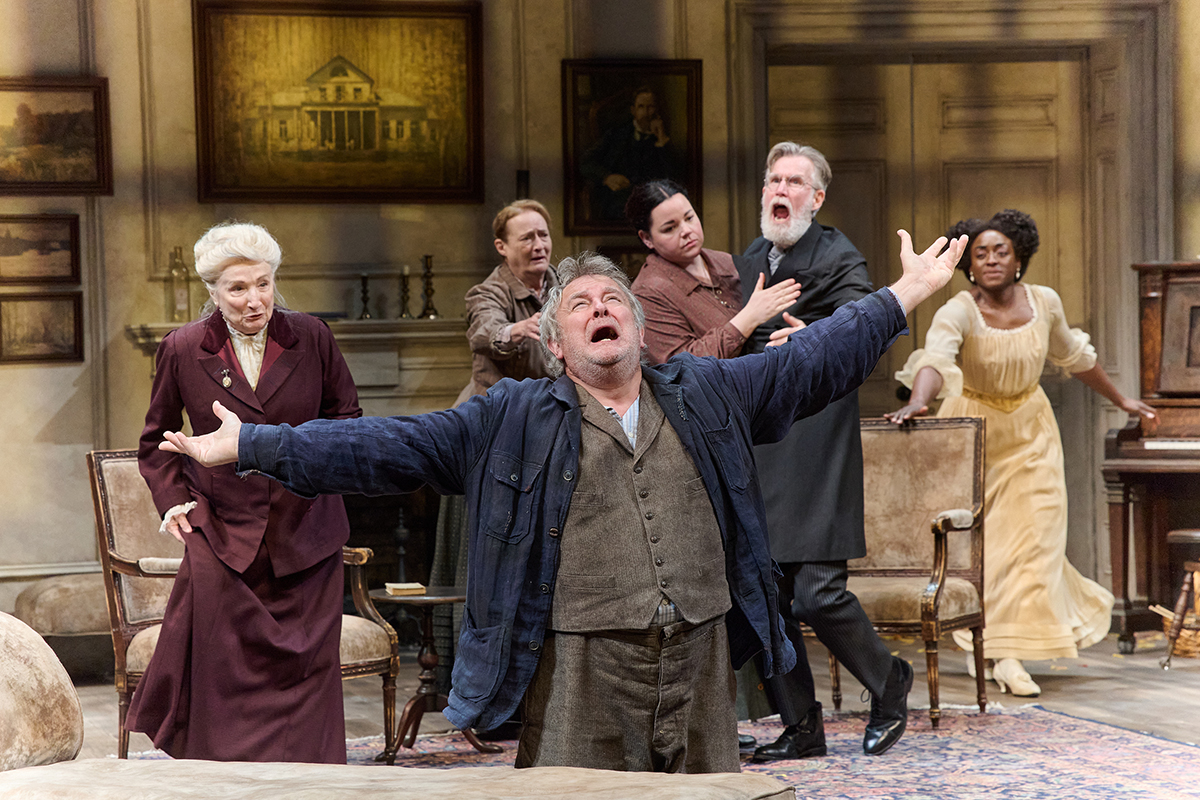MacSequel: Dunsinane (Review)
A contemplation on Macbeth, David Greig's Dunsinane offers reflection on modern global conflicts

Playwright David Greig writes in an interview with The Guardian newspaper that he struggled in the early stages of Dunsinane, a sequel to Shakespeare’s Macbeth, breaking his writer’s block only after he and actors workshopped the concept with improv.
Some of this struggle remains. The problem is not the premise: in the vacuum created by Macbeth’s death, a power play ensues between a not-dead Lady Macbeth (called here by her historical name of Gruach), the newly-installed King Malcolm, and, on a more personal and spiritual front, Siward, the English general who led the incursion into Scotland.
It is a viable contemplation on the original play, and under Grieg’s hand, it offers interesting reflection on modern global conflicts, and (coincidentally) Scotland’s own recent brush with independence. The issues it raises regarding war and capitulation, peace, national identity and all the moral ambiguities therein, are discussed by characters with intelligence. The play stands alone as a thought-provoking, often amusing, tale of love, loss and medieval conflict.
“Greig returns repeatedly to the theme of losing young men to violence. The scenes of grief for these boys, some short, some longer, most in morally uncertain circumstances, are deeply poignant.”
Greig’s exploration of these themes within his narrative is not the problem, but rather the psychological transitions and balance of the piece, particularly as they relate to Siward. In the first act, he is revealed as a hardened soldier, but also, it would seem, a man of principle and intelligence. When a gently compelling connection arises between Siward, who has no family waiting from him in England, and the mysteriously self-possessed Gruach, it is an attractive riff on the original play. It also raises intriguing possibilities: will Gruach manipulate Siward as she did Macbeth? Or will we learn there is another side to her story?
But by Act Two, the emphasis has changed. Siward has put diplomacy before his tentative heart and, as Malcolm’s uneasy hold on the fractious country loosens, armed conflict returns. And with that comes an inexplicable change in Siward’s character. Though one would expect him to be angered and perhaps even bewildered by Gruach’s stealthy rebellion and the relentless guerilla tactics of her people, Siward goes completely off the deep end. He is by turns savage, obsessive and disturbed. The leap from the driven but thoughtful man in Act One to this place of spiritual chaos is just too great.
A subset of this problem is the emotional imbalance. Greig returns repeatedly to the theme of losing young men to violence. The scenes of grief for these boys, some short, some longer, most in morally uncertain circumstances, are deeply poignant. They speak to the unspeakable theft of war and the greatest of all parenthood terrors.
Siward is part of this expression of grief and, thanks to some very affecting emoting by Darrell D’Silva in the role, they are potent moments. But, and this is on Greig, they somehow don’t jibe with his own eventual savagery. Good people commit terrible acts in times of war, and suffer for it during and after, but to capture that particular theme here would have required a more convincing context. Siward’s transitions between experiencing grief, causing grief, and acknowledging both are too hard to reconcile. The progression is a puzzlement in an otherwise carefully constructed dramatic architecture. Perhaps we could say he goes mad with war, mad with love, or simply mad — but it’s too much of a question and director Roxana Silbert does not find a way to answer it.
Still, D’Silva does much to overcome this unevenness. In Act One, he exudes the competency of a seasoned leader, in easy master of the impassioned drive he uses to rally his troops. He cuts the rugged figure of a man who may no longer be young but is, without doubt, viable, and as such, he is a believable object of interest for the quietly powerful Gruach. D’Silva is subtle, unhurried, and nuanced and therefore all the more engaging as this troubled man. As Siward spirals into violence and obsession in Act Two, D’Silva delivers probably the only thing that can save it: unadulterated intensity.
As the mysterious Gurach, Siobhan Redmond evokes a mesmerizing woman, an intriguing mix of age-defying witchery mingled with ancient traditions of matrilineal leadership. She is nothing like most interpretations of Lady Macbeth and perhaps that’s all the more reason it would have been worth exploring her as much as Greig does Siward. Though Redmond speaks volumes with her quietly commanding presence and understated expressiveness, she remains largely unfathomed, save for her grief, which comes in the form of a haunting Elvin keen.
The other cornerstones of the National Theatre of Scotland and Royal Shakespeare Company’s joint production are Keith Fleming as Macduff, Ewan Donald as Malcolm and Alex Mann as Egham, an English officer. Fleming is a credible and vibrant Macduff, pleasingly fluid with the kind of phrasing and delivery that begs for the original, or any other Shakespeare for that matter. He is also a charismatic match for D’Silva and they command the stage when sharing it. Malcolm is a villain, but Greig gives him wit and Donald plays him with a good balance of sly humor and amoral expedience. As Egham, Mann nicely depicts the casual attitude of the English gentry toward Scottish affairs.
Mention must be made of the robust ensemble of young men, English and Scottish, who portray credibly the vibrancy and joy that is so cruelly ended by war. Tom Gill as the boy soldier, narrating the exploits through letters to his mother, is a warm and believable constant. The uncredited actor playing Gruach’s son deserves praise for his brief but highly effective moment.
In need of a tighter psychological concept though it may be, this is nevertheless good, provocative evening from a playwright with much to say.
Dunsinane (![]()
![]()
![]()
![]() ) runs through Feb. 21 at Sidney Harman Hall, 610 F St. NW. Call 202-547-1122 or visit shakespearetheatre.org.
) runs through Feb. 21 at Sidney Harman Hall, 610 F St. NW. Call 202-547-1122 or visit shakespearetheatre.org.
Support Metro Weekly’s Journalism
These are challenging times for news organizations. And yet it’s crucial we stay active and provide vital resources and information to both our local readers and the world. So won’t you please take a moment and consider supporting Metro Weekly with a membership? For as little as $5 a month, you can help ensure Metro Weekly magazine and MetroWeekly.com remain free, viable resources as we provide the best, most diverse, culturally-resonant LGBTQ coverage in both the D.C. region and around the world. Memberships come with exclusive perks and discounts, your own personal digital delivery of each week’s magazine (and an archive), access to our Member's Lounge when it launches this fall, and exclusive members-only items like Metro Weekly Membership Mugs and Tote Bags! Check out all our membership levels here and please join us today!
























You must be logged in to post a comment.